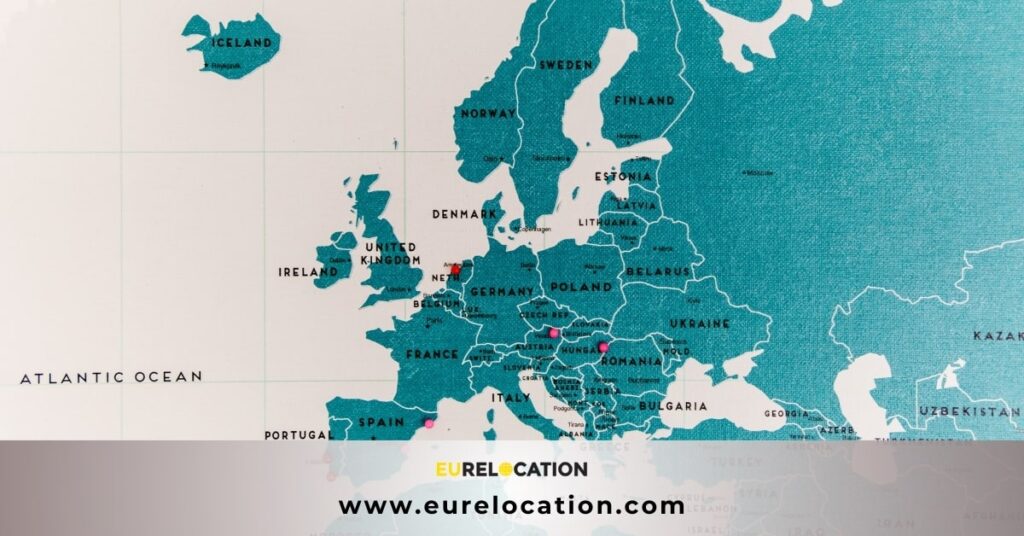Are you wondering, is relocating to Europe in 2025 worth it? Europe is home to diverse cultures, beautiful landscapes, and many opportunities. Moving to Europe could bring a fresh start, but it’s important to think about the good and bad sides before making a big decision. Let’s look at the pros and cons of relocating to Europe in 2025.
The Pros of Relocating to Europe in 2025
1. Is Relocating to Europe in 2025 Worth It? High Quality of Life
One of the top reasons to move to Europe is the high quality of life. Cities like Zurich, Vienna, and Copenhagen offer excellent healthcare, a clean environment, and a strong focus on safety. Many European countries also offer great work-life balance, which can improve your overall well-being. You’ll also find clean streets, efficient public transportation, and plenty of parks.
In Europe, you’ll often benefit from universal healthcare and social services that help make life easier. Paid vacation time, sick leave, and parental leave are common in many countries, giving you extra security and time for relaxation.
2. Rich Culture and History
Europe is full of history, art, and traditions that you won’t find anywhere else. From the Eiffel Tower in Paris to the ancient ruins in Rome, Europe’s cultural attractions are vast. Living in Europe gives you the chance to experience different cultures and enjoy delicious local food. You can visit museums, attend local festivals, and explore beautiful cities.
Living in Europe means you’ll be surrounded by people from all over the world. It’s a great way to learn new languages and customs. If you enjoy learning about different cultures, Europe is a great place to be.
3. Is Relocating to Europe in 2025 Worth It?: EU Benefits
If you choose to move to a country in the European Union (EU), you’ll have some great benefits. The EU allows people to live, work, and travel freely between member countries without needing a visa. This makes it much easier to explore Europe and enjoy its many countries.
In addition to free movement, the EU offers different programs to help businesses, job seekers, and students. If you want to grow your career, you may have better access to jobs across multiple countries, making it easier to find opportunities that suit your skills.
4. Job Opportunities
Europe offers many job opportunities, especially in cities like Berlin, London, and Amsterdam. Many countries are looking for workers in fields like tech, healthcare, and finance. You’ll find a wide range of job openings, from startups to big companies. Salaries in major European cities are often competitive, especially if you work in industries like IT, engineering, and finance.
Workplaces in Europe often have a good focus on work-life balance, meaning you may have more time for your personal life. The work culture is typically less focused on long hours and more focused on productivity, which can lead to a healthier lifestyle.
5. Easy Travel Around Europe
Europe’s location makes it an excellent base for traveling. You can easily visit other countries by train, bus, or budget airline. For example, it’s easy to go from Paris to Barcelona, or from London to Amsterdam, with quick and affordable travel options. If you enjoy exploring new places, living in Europe means you’ll always have easy access to beautiful cities, beaches, mountains, and more.
6. Is Relocating to Europe in 2025 Worth It?: Affordable Education and Healthcare
Many European countries offer affordable education and healthcare. Some countries even offer free education, including university degrees, for residents and EU citizens. This makes Europe a great option if you want to study without taking on a lot of student debt.
Healthcare in Europe is also often affordable or free in many countries. For example, France, Germany, and Sweden have excellent healthcare systems, and many other European countries offer low-cost healthcare for residents. This means you won’t have to worry about expensive medical bills.
Is Relocating to Europe in 2025 Worth It? The Cons
1. High Cost of Living in Some Areas
While Europe offers many benefits, living in certain cities can be expensive. Cities like London, Paris, and Zurich have very high living costs, especially when it comes to rent, food, and transportation. If you choose to live in one of these cities, you’ll need to make sure your salary can cover the costs of living.
While some countries have affordable options, larger cities tend to be more expensive. It’s important to research the cost of living before you move and plan your budget carefully.
2. Visa and Immigration Challenges
If you are not from an EU country, the process of getting a visa can be tricky. Each European country has its own rules and requirements for visas and residency permits. Getting a work or student visa can take time and effort, and you may need to show that you have a job lined up before arriving.
Even once you get a visa, you might face challenges with registering, getting health insurance, and other bureaucracy. The paperwork can be confusing, and it’s important to be prepared for the time and effort required.
3. Is Relocating to Europe in 2025 Worth It? Language Barriers
In many European countries, speaking the local language is essential for getting around and finding work. While many Europeans speak English, especially in big cities, you might struggle in smaller towns or rural areas. If you plan to live in a country like Spain, Germany, or Italy, learning the local language will make your life much easier.
Some jobs may also require you to speak the local language, especially if you are working with local customers or clients. If you’re not ready to learn a new language, this could be a barrier to your relocation.
4. Cold Weather in Some Areas
Europe has a wide range of climates, but in northern countries like Sweden, Finland, and Norway, winters can be long, dark, and cold. For people who are used to warm weather, the winter months can be challenging. Lack of sunlight, snow, and freezing temperatures can impact your mood and make daily life more difficult.
If you are someone who enjoys sunny weather, be sure to consider the climate of the region you plan to move to. Countries in southern Europe, like Spain and Italy, offer warmer weather, but the northern regions can be much colder.
5. Cultural Differences
While Europe is a welcoming place for many, adjusting to a new culture can take time. Each European country has its own way of life, customs, and social norms. Some cultures are more formal, while others are more relaxed. Understanding local traditions and fitting in socially may take time.
If you’re moving from a very different culture, you might experience some culture shock at first. This can affect everything from daily routines to how you interact with people. Be ready to be patient as you learn and adapt to your new environment.
Is Relocating to Europe in 2025 Worth It?
So, is relocating to Europe in 2025 worth it? The decision depends on your personal situation and what you are looking for in a new place to live. If you want a high quality of life, new job opportunities, and a chance to experience diverse cultures, Europe could be a great choice. However, the high cost of living, visa challenges, and cultural differences are factors you’ll need to consider.
If you’re prepared for the challenges and excited about the benefits, relocating to Europe in 2025 could be a life-changing experience. It’s important to research the country you want to move to and make sure it fits your needs. With the right planning and mindset, relocating to Europe can open doors to new opportunities and an exciting future.









